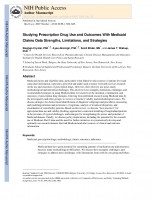Download
| File Size | 294.9 KiB |
|---|---|
| Date | August 31, 2013 |
| Downloads | 0 |
ABSTRACT
Medicaid claims and eligibility data, particularly when linked to other sources of patient-level and contextual information, represent a powerful and under-used resource for health services research on the use and outcomes of prescription drugs. However, their effective use poses many methodological and inferential challenges. This article reviews strengths, limitations, challenges, and recommended strategies in using Medicaid data for research on the initiation, continuation, and outcomes of prescription drug therapies. Drawing from published research using Medicaid data by the investigators and other groups, we review several key validity and methodological issues. We discuss strategies for claims-based identification of diagnostic subgroups and procedures, measuring and modeling initiation and persistence of regimens, analysis of treatment disparities, and examination of comorbidity patterns. Based on this review, we discuss “best practices” for appropriate data use and validity checking, approaches to statistical modeling of longitudinal patterns in the presence of typical challenges, and strategies for strengthening the power and potential of Medicaid datasets. Finally, we discuss policy implications, including the potential for the research use of Medicare Part D data and the need for further initiatives to systematically develop and optimally use research datasets that link Medicaid and other sources of clinical and outcome information.
KEYWORDS
Medicaid; prescription drugs; methodology; claims; outcomes; adherence
Medicaid claims and eligibility data, particularly when linked to other sources of patient-level and contextual information, represent a powerful and under-used resource for health services research on the use and outcomes of prescription drugs. However, their effective use poses many methodological and inferential challenges. This article reviews strengths, limitations, challenges, and recommended strategies in using Medicaid data for research on the initiation, continuation, and outcomes of prescription drug therapies. Drawing from published research using Medicaid data by the investigators and other groups, we review several key validity and methodological issues. We discuss strategies for claims-based identification of diagnostic subgroups and procedures, measuring and modeling initiation and persistence of regimens, analysis of treatment disparities, and examination of comorbidity patterns. Based on this review, we discuss “best practices” for appropriate data use and validity checking, approaches to statistical modeling of longitudinal patterns in the presence of typical challenges, and strategies for strengthening the power and potential of Medicaid datasets. Finally, we discuss policy implications, including the potential for the research use of Medicare Part D data and the need for further initiatives to systematically develop and optimally use research datasets that link Medicaid and other sources of clinical and outcome information.
KEYWORDS
Medicaid; prescription drugs; methodology; claims; outcomes; adherence



